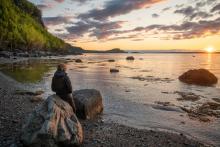A couple of weeks ago my family and I needed to get out of the house. Since we live on the southern edge of Ottawa, it doesn’t take us long to drive down to the St. Lawrence River. The afternoon we spent there started cloudy and blustery, but it ended with brilliant sunshine and a perfect breeze. We didn’t do anything exceptional. It wasn’t warm enough to swim. We watched boats, threw some rocks, built a few sandcastles and tried to name the waterfowl. It was a perfect afternoon (well, except for that one thing that happened . . . and that other thing).
For me, joy is being outside. There are other pleasures in life, that’s true, but being outside with trees and water and animals is a consistent, everyday joy. It works like ballast in my life. Other things go up and down, emotions swirl, success ebbs and flows, but the sun still sparkles off waves, driftwood is always beautiful and a myriad of creatures continue to make their way through the world.
A number of writers have repeated a relevant insight from the book of Job. As you probably remember, Job is an innocent sufferer. He is good and faithful, yet he loses everything. His health, his family and his wealth are all taken away. Naturally, Job wonders why this is. His friends offer their takes on the situation. They blame him, or God or the system. God’s response, and it is the longest speech attributed to God in the entire Bible, is to point to nature.
Here are a few lines from Job 38: “Where were you when I laid the foundation of the earth? Who determined its measurements—surely you know! Have you entered the springs of the sea, or walked in the recesses of the deep?” And here are a few lines from chapter 39: “Do you know when the mountain goats give birth? Do you observe the calving of the deer? Is the wild ox willing to serve you?”
Bill McKibben (an environmentalist and periodic Sunday School teacher) says, “When Job asks why we suffer, God talks about antelopes, vultures, lions, ostriches. . . . The clear and overpowering implication of [God’s] speech is that Job and people in general are but a part of creation, not its central feature.” That is the sense I feel when I’m outside. It isn’t that I experience Job-like suffering or carry out epic debates with God, but I do experience the same mental churn many of us do—wondering ‘What if’, thinking through contingencies, mulling over the news or the stories of people’s lives I’m privileged to know.
Being outside doesn’t make me think that those things don’t matter, but it does put it all in a different context. The outdoor world is one that moves slower. There’s disruption in natural ecosystems, but also quite a lot of consistency. There is also, and I think this is key, immense beauty. One of the things I hope our communal worship does is help us see the beauty of the world, and our presence in it, as a gift. The theologian and one-time Albertan farm kid, Norman Wirzba, calls this “iconic seeing.” What he means is that we see the world around us as an icon, a window into the divine. Seeing it this way requires a cultivated sense of vision. We imply this cultivated vision, this iconic seeing, when we use the term ‘creation’ instead of ‘nature.’ To be conscious of our being in creation is to live within generosity on a landscape belonging to another.
All kinds of people find joy in the outdoors. There is a natural connection between ourselves and the world. Part of it is surely the sense of smallness and mystery experienced by Job. And part of it, for me at least, is the way it points to something beyond, something transcendent, something infinite and peaceful. The wonderful thing is that this experience is free. It’s a gift we receive simply by being alive and cultivating “iconic seeing.”
Anthony G. Siegrist pastors at Ottawa Mennonite Church in Ottawa, Ont. He blogs at anthonysiegrist.com, where this post originally appeared.



Add new comment
Canadian Mennonite invites comments and encourages constructive discussion about our content. Actual full names (first and last) are required. Comments are moderated and may be edited. They will not appear online until approved and will be posted during business hours. Some comments may be reproduced in print.